The Miles Burghoff Master Plan
Rookie pro’s philosophical outlook on bass fishing has him in the AOY lead
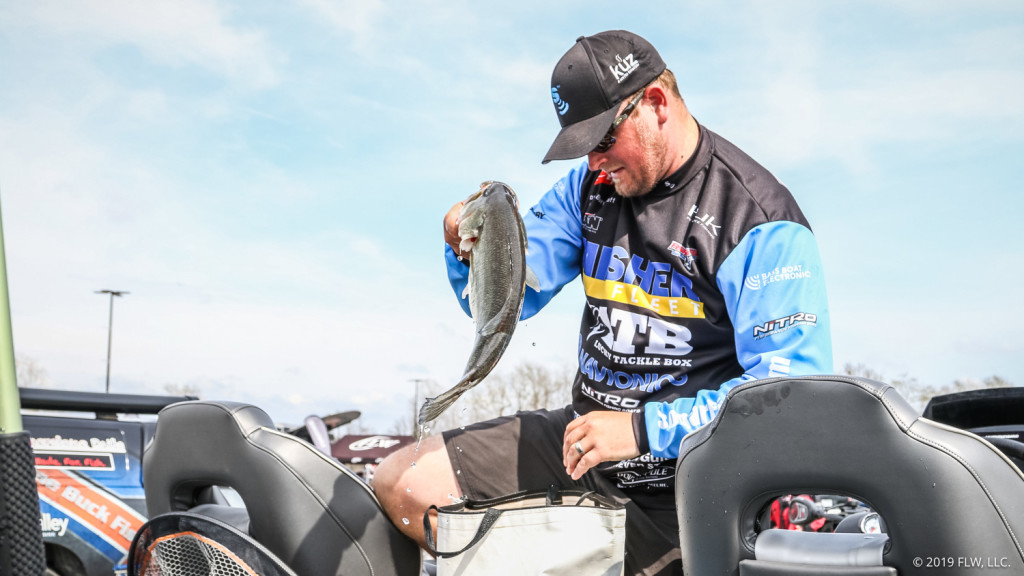
Miles Burghoff is in a rare position. He’s a rookie on the FLW Tour, and he’s leading the 2019 Angler of the Year race with two tournaments left to fish.
Traditionally, the AOY frontrunners are veteran pros in the prime of their careers, not rookies who are often still trying to learn their way around a full season of Tour competition.
Burghoff, however, isn’t your traditional rookie. Unlike many burgeoning pros who establish their careers in a region before expanding to new waters on the national level, or who use college bass fishing to vault into the pro ranks after just a few years, Burghoff spent a decade patiently (but strategically) picking his way through the lower tiers of the bass tournament world to wind up at the starting line of the Tour.
His path, which took him as far away as Alaska, through four state-to-state moves and seven BFL divisions, suggests that Burghoff was only drifting about, but there was nothing random about it. Every move Burghoff made was carefully thought out so that when he arrived on Tour, his business, media and fishing skills were ready.
Beyond the pragmatic planning, however, this “philosophical angler” can credit some of his success from something beyond just having the ability to understand bass and cast a lure. Careful study of the psychology of performance and philosophies of talent development have helped him maximize his own potential right from the start.
It really seems as if Burghoff is executing a master plan, and that he’s doing it essentially flawlessly. And now, at least for the moment, he’s on top of the bass fishing world.
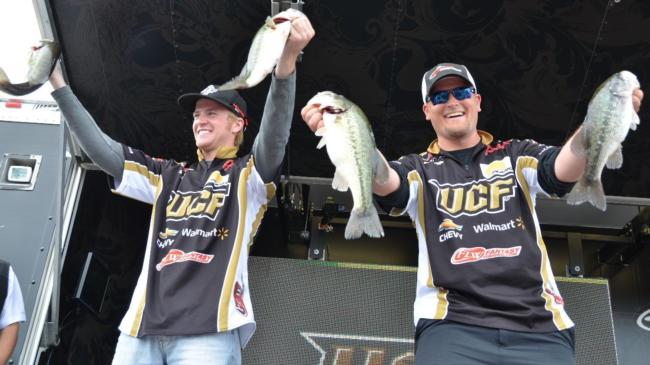
A fishing education
To understand how Burghoff made it to this point, you have to know part of his backstory. Of course, you might already know it.
Burghoff, who grew up in California, has been blogging about his tournament dreams for Bassfan.com since he was a student living in a travel trailer to save money while attending the University of Central Florida, from where he graduated in 2012.
“I got really lucky with Bassfan,” Burghoff admits. “John Johnson [Bassfan senior editor] is actually from Paradise, Calif., where I grew up, which I had no idea about until I moved to Florida.”
A common hometown was a connection that brought them together. Burghoff took it from there.
“There was an opening for someone to start writing about the very bare bones of tournament fishing; the very beginnings of a career; somebody that’s really just starting. That’s kind of where we went from.”
Through his blog and social media, and eventually as one of the hosts of the fishing show Sweetwater, every step of Burghoff’s career has played out in front of the public.
He documented moves from California to Florida to Alabama to California to Tennessee, where he now lives with his wife, Katie. He even branded himself by his fishing-themed nickname, “Sonar.”
In those early years, Miles put as much into studying the media side of fishing as he did the bass.
“I was getting cassette tapes of Tim Tucker and his ‘how to work with the media’ presentations,” he explains. “I forget the name of that series, but it was about how to get sponsors. I’d listen to those. I’d read anything I possibly could. I’d absorb any information I could on bass fishing. Then I went to school for marketing. I was fortunate enough to recognize this business I’m getting into isn’t about how to catch fish. It’s about how to get people excited to catch fish, then teaching them about the products and services they need to be successful in the outdoors.
“That’s what I’ve been trying to base my whole career off of. My passion is fishing and competing in tournaments, but my job is being an ambassador of the sport.”
Still, the moves around the country weren’t just to produce good blog fodder. Miles and Katie’s relationship was one of the influencing factors that led to the return move to California, but for the most part, the Burghoff family’s roots reach so wide because of Miles’ desire to get his butt kicked in bass fishing tournaments … at least for a little while.
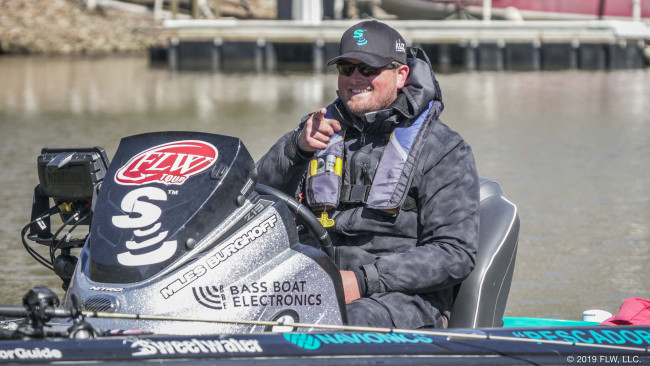
Finding comfort in the uncomfortable
Burghoff’s strategy for preparing for the fishing side of the Tour was to constantly put himself in new and uncomfortable situations by fishing new regions against the best locals.
Just look at his FLWFishing.com profile, which reveals a vagabond bass tournament existence. He’s fished two Costa FLW Series divisions, seven T-H Marine BFL divisions, a handful of BFL postseason events, YETI FLW College Fishing tournaments, The Bass Federation events and a number of Bassmaster Opens.
He’s been all over.
“I made that move [from California to Florida] because I needed to go learn those types of lakes,” Burghoff says. “I needed to go somewhere that, No. 1, the Tour would always visit at the beginning of the season. No. 2, it’s such a dramatic change. The fisheries in Florida were so different than anything else I’d fished. I needed to learn that.
“Once I started feeling comfortable in Florida, I started going to different regions and fishing different divisions of the BFL. When I started to get comfortable in a certain region, I needed to make a move. I was constantly just trying to feel uncomfortable. I’ve seen some of my biggest growth periods of life come from uncomfortable situations. All those BFLs are the reason I’m doing so well.”
Another example is when Burghoff spent his first season guiding in Alaska – a summer gig he landed while in college.
“My first season up there, I went into it as a lazy kid,” he admits. “I was so unprepared for the amount of work required. I had to either sink or swim. My work ethic and my acceptance of the struggle started there.”
The idea that growth can come from failure swims against the current in a sport where winners are remembered, and everyone else is an also-ran. But it’s a concept championed by talent coaches who look at performance in the long term.
Burghoff understands.
“It’s about mental toughness and not being afraid of failure,” he adds. “I hate losing, but I embrace failure. Failure is OK as long as you learn from it and you push through it.
“I’ve never dominated one division because I’ve never wanted to. I wanted to be that guy that does well on the Tour. Fishing these different divisions, that allows me to survive. Because I’ve had those experiences in different situations, I’ve built my instincts up. I don’t have a good memory, but I have a good instinctual memory.”
Settling in east Tennessee put the pro close to a variety of fisheries and some of the most common lakes the Tour visits. He also admits to struggling at times on Tennessee River reservoirs, so being close to Chickamauga, Nickajack and Guntersville gives him the chance to overcome that hurdle.
Every step has been taken with eventual Tour competition in mind. Even the way Burghoff practiced for BFL events was strategic.
“The great thing is I’ve always known I was going to be fishing at the Tour level, where I’ll have a shorter practice period. When fishing these BFLs, I practiced no more than two days,” he says. “Actually, two days was a rarity for me. I used shorter practice periods and usually used one day of practice per tournament day.”
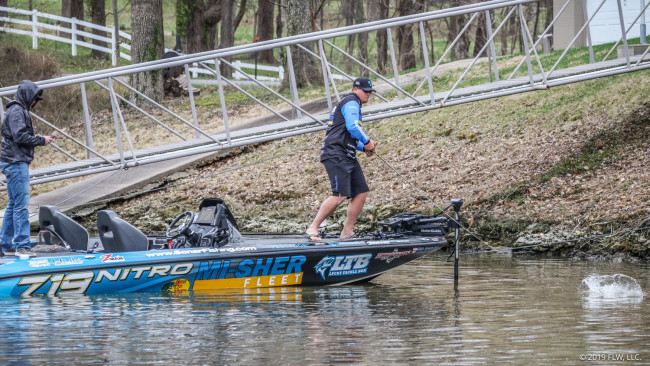
Understanding talent
Beyond just skill development, Burghoff studies talent, and the ways great performers develop talent.
“I don’t believe in natural-born talent,” he says. “I think that talent is learned. I really think that anybody that does really well at any sport or anything in life, they’re approach to it is what makes them special.”
He credits the book “The Psychology of Winning” by Denis Waitely with helping him understand this concept.
“It taught me that, No. 1, natural talent is a myth, and hard work, dedication and accepting your strengths is kind of the recipe for success.”
Translated to the tournament-fishing business, Burghoff believes a lot of anglers that get pegged as natural talents early in their careers are actually the product of a lot of hard work and focused effort during their developmental years. In many cases they specialized in a particular skill set that was compatible with their personality and abilities, nurtured that skill set, mastered it, and learned to apply it in competition.
Burghoff, now 32, struggled with this at first. He admits it was tough for him to see other anglers his age or younger having great success while he was still trying to make it. He wondered if they were more talented.
Eventually, he realized everyone’s path is different. By focusing on his process and preparation in tournaments and exploring his own fishing strengths, he was able to nurture his growth as an angler. That type of self-reflection was a big step in his career.
“There are just certain guys that have a specific skill set, and they embrace it and they learn from it. Those guys that embrace that skill set, they are the talented ones. They focus on their core strengths early on. Others take a while to finally figure it out. Talent is when somebody is just able to accept, finally, ‘I’m an individual, this is my personality, this is what I do, and this is what I need to do to excel.’ You have to learn what works for you and what’s never going to be your strength.”
In Burghoff’s case, some finesse tactics such as drop-shotting or fishing small swimbaits in deep water are weaknesses. Power-fishing, adapting on the fly and staying focused on his confidence techniques are among his many strengths.
“At the end of practice, I excel at knowing what’s going to work for me the next day and what’s not. I’ll abandon something that’s widely regarded as being the deal if it’s not going to be the deal for me. I think that’s why I do well in a lot of different areas.”
That played out at the most recent FLW Tour event on Cherokee Lake. After a dismal practice spent trying to catch smallmouths with small swimbaits on gravel points, Burghoff abandoned what everyone said was working and put his own talents in play. He went to largemouth water and threw a wacky rig.
Burghoff finished 46th, made $10,000 and took over the AOY lead.
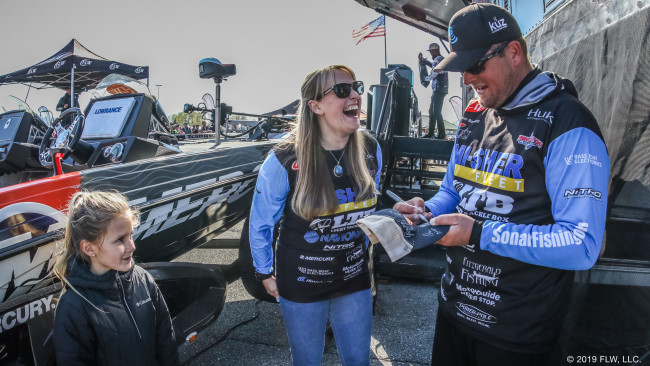
Harnessing motivation
In Daniel Coyle’s book “The Talent Code,” the author outlines three key elements necessary to develop a high level of skill: deep practice, master coaching and ignition.
The latter one, ignition, is the hardest to understand if you don’t already have it yourself. Ignition is motivation, but it’s also more. It’s an innate desire to commit to a pursuit above all else, a competitive fire, a primal urge.
All great tournament anglers have it, even if they can’t describe how the push to be great manifested within them.
“The only way I can explain it is it [bass fishing] rules my life,” Burghoff says. “Living in that trailer [in college], that’s all I thought about. I literally didn’t sleep at night the majority of the time, thinking about the next day of fishing and what I needed to do to get better in the business side and the tournament side.
“I want it so bad. I don’t know what it is. The mix of fishing and competition is just … it’s unbearable. I have to do well. But at the end of the day I also have learned how to accept when I do terrible in a tournament and learn from it instead of letting it get the best of me.”
Which gets us to today, with Burghoff atop the FLW Tour standings. His sponsor support is in place. His business plan is solid. His skills are sharp. He’s motivated. And he has a chance to be the first rookie to win AOY since Shin Fukae in 2004.
“It’s incredible. It really is,” Burghoff says. “I was sitting there the other night, my wife and I were just watching TV, and I looked on FLWFishing.com and looked down the list of the guys below me in the standings. My God, these guys are dedicating their heart and soul to this sport just like I am, and I’m at the top right now. That blew my mind.”
No pro who finds himself in Burghoff’s position can fully ignore the situation, but typically AOY-leading pros have been pretty adept at shrugging off the pressure and pretending they aren’t paying attention as the season winds down.
It’s interesting that Burghoff isn’t as coy. He’s completely aware that Scott Martin trails by just 17 points with only Chickamauga and Champlain left on the schedule, and he’s harnessing the challenge for motivation.
“I’m a competitor, so I don’t want to say I’m intimated by anybody, but I am. I’m always intimidated. But I don’t let the intimidation control me,” Burghoff explains. “I’m not going to lie down for those guys. The intimidation motivates me to be even better.
“I don’t want to point out just one person behind me because they’re all outstanding anglers, but Scott Martin, in terms of stats on Chickamauga and Champlain, is terrifying. That is the greatest motivation I’ve got right now. I can’t tell you how much of a gift that is to have Scott Martin behind me.”
It’s an unusual point of view to enjoy having a shark on your heels with two major events left, but a lot about Burghoff’s approach to tournament fishing is unique. To him, this is just another of those uncomfortable situations that stands to be a learning experience, win or lose.
With that mindset, there are only positive outcomes, and the Miles Burghoff Master Plan will remain right on track.